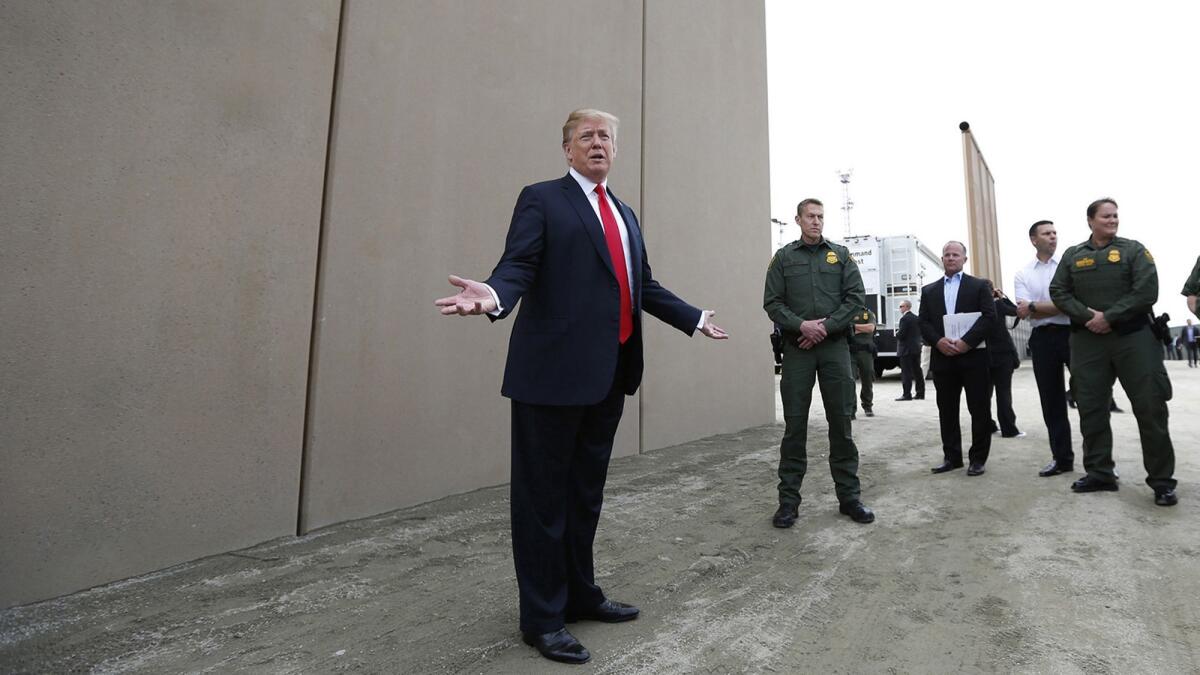‘No factual basis’ for a wall emergency, former national security officials declare

- Share via
Reporting from SUMUR, Indonesia — A bipartisan group of 58 former senior national security officials issued a statement Monday saying that “there is no factual basis” for President Trump’s proclamation of a national emergency to build a wall on the U.S.-Mexico border.
The joint statement, whose signatories include former Secretary of State Madeleine Albright and former Defense Secretary Chuck Hagel, comes a day before the House is expected to vote on a resolution blocking Trump’s Feb. 15 declaration.
The former officials’ statement, which will be entered into the Congressional Record, is intended to support lawsuits and other actions challenging the national emergency proclamation and to force the administration to set forth the legal and factual basis for it.
“Under no plausible assessment of the evidence is there a national emergency today that entitles the president to tap into funds appropriated for other purposes to build a wall at the southern border,” the group said.
Albright served under President Clinton, and Hagel, a former Republican senator from Nebraska, served under President Obama.
Also signing were Eliot Cohen, State Department counselor under President George W. Bush; Thomas Pickering, President George H.W. Bush’s ambassador to the United Nations; John F. Kerry, Obama’s second secretary of State; Susan Rice, Obama’s national security advisor; and former intelligence and security officials who served under Republican and Democratic administrations.
Trump’s national emergency declaration followed a 35-day partial government shutdown, for which he claimed responsibility after Congress did not approve the $5.7 billion he sought to build a wall.
In announcing his declaration, Trump predicted that lawsuits and “possibly ... a bad ruling, and then we’ll get another bad ruling” before winning at the Supreme Court.
The former security officials’ 11-page declaration, a copy of which was shared with the Washington Post, sets out their argument disputing the factual basis for the president’s emergency.
Among other things, they said, illegal border crossings are at nearly 40-year lows. Undetected unlawful entries at the U.S.-Mexico border decreased from 851,000 to nearly 62,000 between 2006 and 2016, they said, citing Department of Homeland Security statistics.
Contrary to the president’s assertion, there is no documented emergency at the southern border related to terrorism or violent crime, they said, citing administration reports and independent think tank analyses.
Similarly, they state that there is no drug trafficking emergency that can be addressed by a wall along the southern border, noting that “the overwhelming majority of opioids” that enter the United States are brought in through legal ports of entry, citing the Justice Department.
They also argue that redirecting money pursuant to the national emergency declaration “will undermine U.S. national security and foreign policy interests.” And, they assert, “a wall is unnecessary to support the use of the armed forces,” as the administration has said.
Some of the same former officials wrote a joint declaration disputing the factual basis for the president’s order shortly after he took office in January 2017 barring entry to foreign nationals from seven predominantly Muslim countries. The former officials asserted that the order was not based on a bona fide national security assessment but on “a deliberate political decision to discriminate against a religious minority.”
Their views were filed as a joint declaration and later as a friend-of-the court brief in lawsuits challenging the original order and subsequent revisions, and was cited by almost every federal judge who enjoined the ban. By the time the challenges reached the Supreme Court, the administration had significantly narrowed the ban, which the high court upheld on a 5-4 vote.
With respect to the declared national emergency, plaintiffs have filed two cases in the District of Columbia, two in California and one in Texas.
Ellen Nakashima writes for the Washington Post
More to Read
Get the L.A. Times Politics newsletter
Deeply reported insights into legislation, politics and policy from Sacramento, Washington and beyond. In your inbox twice per week.
You may occasionally receive promotional content from the Los Angeles Times.









